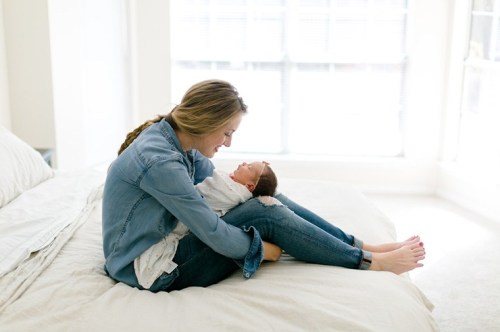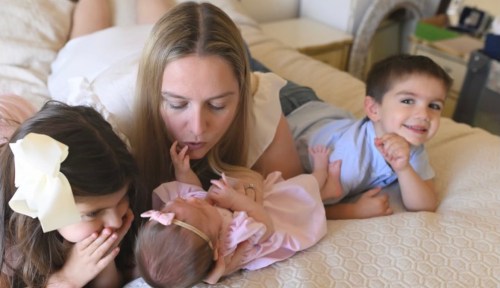Postpartum Depression May Look More Like Anxiety Than Sadness
When obsessing over your new baby's feeding schedule may be a red flag.

You made it through 40 weeks of nausea, dizziness, brain fog and the constant need to pee. You and your baby are both home now and healthy. Well-wishers kindly bring by food and advise you to sleep when the baby sleeps—but you have no appetite, despite breastfeeding a dozen times a day, and there’s no way you can sleep when they baby sleeps. Who would watch her to make sure nothing terrible happens? Your best friend and your husband have both asked how they can help you get more sleep and relax a little and enjoy new motherhood, but they don’t seem to understand that you’re the one who is ultimately responsible for the baby, and no one else is going to be able to care for her like you.
Experts in This Article
doula, and CEO and co-founder of sexual and reproductive health education platform Loom
This may not sound like postpartum depression, but it very well could be. For new moms, sadness, exhaustion, and disinterest in the baby raise alarms in ways that anxiety, insomnia, and hypervigilance may not. Postpartum depression is only a partial description of the wider range of perinatal mood and anxiety disorders (PMADs), which can manifest in many ways. Women who struggle with paralyzing anxiety post-birth may not be getting the help they need.
“Depression doesn’t always look sad. Depression can look like anger or hypervigilance.” —Erica Chidi Cohen, doula and co-founder and CEO of Loom
“Depression doesn’t always look sad. Depression can look like anger or hypervigilance,” says Erica Chidi Cohen, a doula and co-founder and CEO of Loom, a childbirth, pregnancy, and reproductive wellness community in Los Angeles. “What’s under-discussed is the anxiety and the panic.”
Cohen says that the postpartum period—the eight weeks or so immediately after birth, when the body is in a state of rapid repair and recovery from pregnancy and childbirth—is not understood very well in general, and postpartum care in this country is severely lacking.
“People think that postpartum depression has a lot to do with feeling really sad, not being interested in baby, or a loss of appetite,” Cohen says. She adds that 70 percent of women experience a hormonal withdrawal after delivery, which often leads to the “baby blues” in the first week with their newborn. “But mood disorders like depression and anxiety can happen within the first two years,” she notes.
Research shows that women suffering from PMADs experience anxiety at about the same rate as depression. “While some degree of anxiety is considered normal after childbirth, between 14 and 15 percent of postpartum women report symptoms of anxiety that interfere with their ability to function,” says Karen Kleiman, MSW, and founder and director of The Postpartum Stress Center. “This number is roughly the same as it is for women with symptoms of postpartum depression.”
Kleiman notes that symptoms to be concerned about include excessive and constant worry, feelings of impending doom, panic attacks, and obsessive thinking. “The most distressing of all anxiety symptoms are negative unwanted intrusive thoughts of harm coming to the baby,” she says. “It can make women feel as though they are losing their mind or experiencing a psychotic episode, or that they are not fit to be a mother. But scary, obsessive thoughts are anxiety-driven and are extremely common.” (Though keep in mind, postpartum psychosis is also a real disorder, despite being rare. Reach out to your doctor immediately if you’re having hallucinations or paranoid thoughts.)
Women who have struggled with anxiety in the past, or with obsessive thinking, may be at higher risk. “It is not uncommon for women with severe anxiety to describe themselves as a chronic worrier,” says Kleiman.
While mood disorders during the postpartum period have a strong hormonal component, both Cohen and Kleiman note that external factors and attitudes can contribute as well.
Cohen says that she sees more anxiety in postpartum moms than she used to. She attributes it to the unique combination of learning new skills, a lack of sleep, and uncertainty. “When women feel like they’re not getting things done and they’re not in control of what’s happening, it can create a lot of hypervigilance,” she says. The modern pressure for constant achievement—whether it’s at work or by meticulously tracking diapers, feeds, and sleep time on an app—can compound anxiety, she notes.
“Our culture does not generally tolerate a new mother not feeling good about being a new mother,” says Kleiman. “Moms who express ambivalence or anxious despair are often met with with dismissive or patronizing responses.”
The good news is the PMADs, including acute anxiety, are highly treatable through medication and counseling, quality sleep, and good nutrition. The biggest challenge may be in asking for and accepting help. Kleiman’s organization has a postpartum toolkit for expecting families, so that pregnant women, their partners, and other loved ones can prepare in advance.
“Symptoms of severe anxiety need to be taken seriously and treated,” Kleiman says. “So moms can move forward through this transition into motherhood with confidence and a sense of well-being.”
Sign Up for Our Daily Newsletter
Get all the latest in wellness, trends, food, fitness, beauty, and more delivered right to your inbox.
Got it, you've been added to our email list.










